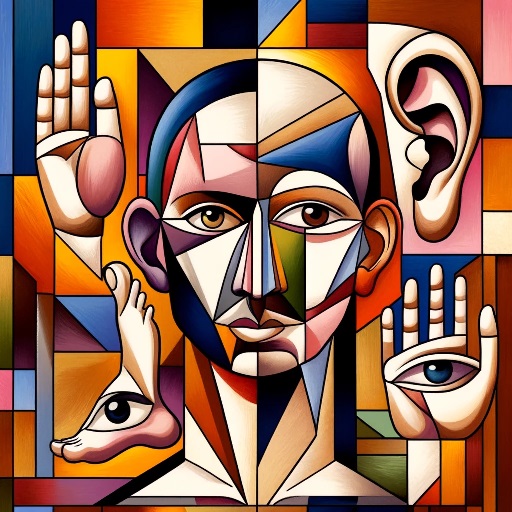
The Body Has Many Members
ChatGPT-4o/DALL-E3, 2024-05-16
My dear friends,
In 1 Corinthians 12:12-31, the Apostle Paul speaks of the body of Christ as a single entity composed of many members, each indispensable and uniquely gifted. In fact, all beings are interconnected, like the limbs of a single organism. When we act for the benefit of one, we act for the benefit of all.
and has many members,
and all the members of the body,
though many, are one body,
so it is with Christ.
For in the one Spirit
we were all baptized into one body
--Jews or Greeks, slaves or free
--and we were all made to drink of one Spirit.
- 1 Corinthians 12:12-13
Paul emphasizes unity in diversity, a truth the Bodhisattva recognizes as the interdependence of all sentient beings. Whether we are "Jews or Greeks, slaves or free," the Spirit, like Bodhicitta—the "Awakening Mind" of compassion and wisdom—flows through all who welcome it, erasing boundaries of identity and fostering a sense of universal oneness. Just as the body thrives when all its members work in harmony, so the community of sentient beings flourishes when each contributes according to their nature, united by love and wisdom.
If the foot would say, "Because I am not a hand, I do not belong to the body,"
that would not make it any less a part of the body.
And if the ear would say, "Because I am not an eye, I do not belong to the body,"
that would not make it any less a part of the body.
If the whole body were an eye, where would the hearing be?
If the whole body were hearing, where would the sense of smell be?
But as it is, God arranged the members in the body, each one of them, as he chose.
- 1 Corinthians 12:14-18
In this passage, Paul affirms the necessity of each member of the body, no matter how humble their role. This reflects the principle of interdependent origination: Each being, like each body part, has a unique purpose and function, and no one is dispensable. Just as a Bodhisattva sees all beings as equally worthy of compassion, Paul teaches that no one should feel inferior or excluded from the divine plan. Every gift, no matter how small, contributes to the greater harmony.
As it is, there are many members, yet one body.
- 1 Corinthians 12:19-20
Paul's insight invites us to embrace the diversity within the unity of the body. For the Bodhisattva, this teaching is an affirmation of the vast spectrum of beings and their unique qualities. Just as a single body thrives through its varied functions, the spiritual path flourishes when all beings are supported in manifesting their unique potentials. This is the wisdom of non-duality: diversity and unity are not in opposition but are mutually enriching.
nor again the head to the feet, "I have no need of you."
On the contrary, the members of the body that seem to be weaker are indispensable,
and those members of the body that we think less honorable we clothe with greater honor,
and our less respectable members are treated with greater respect;
whereas our more respectable members do not need this.
But God has so arranged the body, giving the greater honor to the inferior member,
that there may be no dissension within the body,
but the members may have the same care for one another.
If one member suffers, all suffer together with it;
if one member is honored, all rejoice together with it.
- 1 Corinthians 12:21-26
Here, Paul speaks of the mutual care and honor shared among members of the body, echoing the Bodhisattva's practice of equanimity, which sees the weakest, most vulnerable beings as worthy of the greatest care and protection. The teaching that "if one member suffers, all suffer together" aligns with the Bodhisattva's vow to alleviate the suffering of all beings, understanding that no being's happiness is isolated from another's.
And God has appointed in the church first apostles, second prophets, third teachers;
then deeds of power, then gifts of healing,
forms of assistance, forms of leadership, various kinds of tongues.
Are all apostles? Are all prophets? Are all teachers? Do all work miracles?
Do all possess gifts of healing? Do all speak in tongues? Do all interpret?
But strive for the greater gifts.
- 1 Corinthians 12:27-31a
Paul's enumeration of gifts reminds us that each person's abilities contribute uniquely to the whole. For the Bodhisattva, this diversity of gifts serves the greater goal of liberating beings from suffering. By celebrating these differences without attachment or pride, we cultivate the humility to use our talents in service of others. The "greater gifts" Paul speaks of resonate with the Bodhisattva's ultimate aspiration: to awaken wisdom and compassion in all beings.
- 1 Corinthians 12:31b
The "more excellent way" to which Paul refers is love, which he will expound upon in the next chapter. For the Bodhisattva, this love is bodhicitta, the all-embracing compassion that seeks the liberation of all beings. It transcends distinctions and embodies the wisdom that sees all as interconnected and equally deserving of infinite care. Love is the path and the goal, the essence of the Bodhisattva way.
Thus, 1 Corinthians 12:12-31 beautifully illustrates the Bodhisattva path, teaching us to honor the unique gifts and roles of all beings, to cultivate mutual care, and to walk the "more excellent way" of love and compassion. May we, like Paul, embrace this sacred calling to serve the whole body of life.